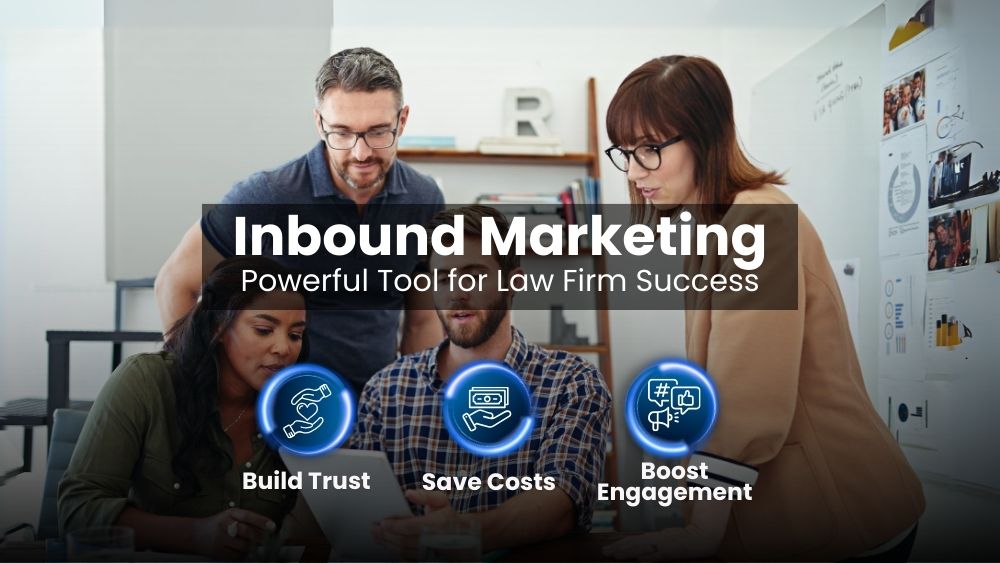In today’s fiercely competitive legal landscape, attracting and retaining clients is not just important—it’s essential for survival. According to a survey of small firms from Thomson Reuters, client acquisition is the top area of concern, making it crucial for smaller and mid-sized law firms to stand out with every advantage they can.
Inbound marketing has become a game-changer, providing a powerful means to drive client acquisition and build lasting relationships. This article explores what inbound marketing is, why it’s crucial for law firms like yours, and how you can implement an effective inbound marketing strategy.
Understanding Inbound Marketing
As defined by Tech Target, inbound marketing is a broad term used to describe a strategy whereby businesses attract leads (clients/customers) by drawing them in naturally, potentially through search engine optimization (SEO), social media, or word-of-mouth. For law firms, effective inbound marketing is generally focused on the creation of reliable, informative, and interesting original content
Unlike traditional marketing, which often interrupts potential clients with unsolicited messages, inbound marketing seeks to draw people in by providing solutions to their problems and answering their questions. For law firms, this means creating content that addresses the legal concerns of potential clients and showcases the firm’s expertise.
Why Inbound Marketing is Crucial for Law Firms
1. Building Trust and Authority
Clients seeking legal assistance are looking for firms they can trust. By consistently providing high-quality, informative content, law firms can establish themselves as authorities in their field. Whether through blog posts, white papers, or video content, demonstrating knowledge and reliability helps build trust with potential clients.
2. Cost-Effective Client Acquisition
Inbound marketing can be more cost-effective than traditional advertising. While it requires an initial investment in content creation and strategy, the long-term benefits include lower client acquisition costs. High-quality content continues to attract clients long after it’s published, providing ongoing returns on investment.
3. Enhanced Client Engagement
Inbound marketing fosters better engagement with potential clients. By offering valuable information and resources, law firms can engage their audience more deeply, leading to higher conversion rates. Interactive content like webinars and Q&A sessions can further enhance client engagement.
Key Strategies for Effective Inbound Marketing
1. Content Creation
Developing relevant and valuable content is at the heart of inbound marketing. Law firms should focus on creating various types of content, including blog posts, eBooks, case studies, and videos. The content should address common legal issues, answer frequently asked questions, and provide insights into the firm’s areas of expertise.
2. Search Engine Optimization (SEO)
SEO is crucial for ensuring that your content reaches the right audience. By optimizing content for search engines, law firms can improve their visibility and attract more organic traffic. This involves using relevant keywords, optimizing meta tags, and ensuring a mobile-friendly website.
3. Social Media Engagement
Social media platforms are powerful channels for distributing content and engaging with potential clients. Regularly sharing valuable content on platforms like LinkedIn, Facebook, and Twitter can help law firms reach a broader audience. Engaging with followers through comments and direct messages also helps build relationships and trust.
4. Email Marketing
Email marketing remains an effective way to nurture leads and keep in touch with clients. By offering valuable content and updates through email newsletters, law firms can stay top-of-mind for potential clients. Segmenting email lists based on client interests and behaviors can also improve the relevance and effectiveness of email campaigns.
5. Analytics and Continuous Improvement
Monitoring and analyzing the performance of inbound marketing efforts is essential for continuous improvement. Law firms should use analytics tools to track website traffic, content engagement, and lead conversions. This data can provide insights into what’s working and where adjustments are needed.
Conclusion
Inbound marketing offers law firms a strategic and cost-effective way to attract and retain clients. By focusing on creating valuable content, optimizing for search engines, engaging on social media, leveraging email marketing, and continuously analyzing performance, law firms can build trust, enhance engagement, and drive client acquisition.
However, inbound marketing can be complicated, requiring a deep understanding of digital marketing tactics and continuous effort to stay ahead of the competition. At SunRize Marketing, we specialize in helping law firms develop and implement successful inbound marketing strategies. Contact us today to learn how we can help your firm thrive in a competitive market.



I don’t think the title of your article matches the content lol. Just kidding, mainly because I had some doubts after reading the article.
Your article helped me a lot, is there any more related content? Thanks!
I don’t think the title of your article matches the content lol. Just kidding, mainly because I had some doubts after reading the article.
Thank you for your sharing. I am worried that I lack creative ideas. It is your article that makes me full of hope. Thank you. But, I have a question, can you help me?
Your point of view caught my eye and was very interesting. Thanks. I have a question for you.
I don’t think the title of your article matches the content lol. Just kidding, mainly because I had some doubts after reading the article.
Thank you, your article surprised me, there is such an excellent point of view. Thank you for sharing, I learned a lot.
Pingback: Digital Marketing Trends That Law Firms Need to Embrace in 2023 | A Bun In The Oven
Thank you, your article surprised me, there is such an excellent point of view. Thank you for sharing, I learned a lot.
I don’t think the title of your article matches the content lol. Just kidding, mainly because I had some doubts after reading the article.